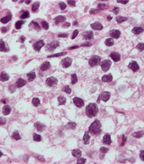ASCO: Post-Surgery Surveillance Found Safe in Seminoma
Surveillance of patients with stage I seminoma following orchiectomy can spare a majority of patients from adjuvant chemotherapy with a low risk of relapse, according to results presented at the 2013 ASCO meeting.
Surveillance of patients with stage I seminoma following orchiectomy can spare a majority of patients from adjuvant chemotherapy with a low risk of relapse, according to results presented at the 2013 annual meeting of the American Society of Clinical Oncology (ASCO) in Chicago.

Micrograph of a testicular seminoma. H&E stain; Copyright © 2009
Nephron
The current standard of care for stage I seminoma is orchiectomy (removal of the testicle) followed by surveillance; however, to date, this strategy has not been formally evaluated on a national scale. Therefore, a cohort study of Danish stage I seminoma patients was performed, collecting data from a national database on 1,822 individuals diagnosed from between 1984 and 2008. The study was designed to assess the risk of relapse following orchiectomy to evaluate the efficacy of surveillance. Stage I seminoma is defined as cancer local to the testes lacking clinical, imaging, or biochemical evidence of disseminated disease. The results were presented by Mette Mortensen from the Copenhagen University Hospital.
The database of germ-cell cancer patients included a total of 4,683 cases, of which 1,822 were stage I seminoma. Researchers were able to pull information relating to outcomes, relapses, treatment of relapses, and causes of death for analysis. Prognostic factors could also be determined from these data. Collection from these databases was continued until December 2012.
The results showed clear benefit for the surveillance strategy in terms of relapse. The median follow-up time for patients was 15.4 years, and of the 1,822 patients, 355 (19.5%) experienced a relapse. During the follow-up years, only 10 patients died due to treatment- or cancer-related causes. The median time to relapse was 13.7 months (range 1.2–173.3 months). Most of the relapses occurred within the first 2 years after orchiectomy (72.4%). A total of 20.3% of relapses occurred in the next 2 to 5 years, and 7.3% of relapses occurred after 5 years.
Overall, the researchers identified a disease-specific 10-year survival rate of 99.5% . Importantly, three prognostic factors for relapse were identified, including tumor size greater than 4 cm, the presence of vascular invasion, and levels of human chorionic gonadotropin above 200 IU/L. The high disease-specific survival and the relatively low rate of relapse overall led to the conclusion that surveillance is a safe and effective strategy for stage I seminoma patients. “As only 19.5% of the patients relapse, the surveillance strategy spares the remaining 80% of the patients from unnecessary adjuvant treatment after orchiectomy,” said Mortensen during the presentation.